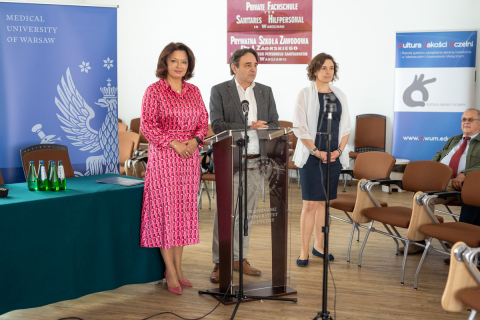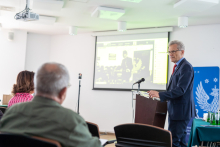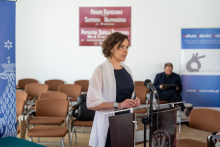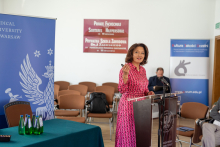The event was organized by the Plenipotentiary of the Rector of MUW for Educational Quality and the Office of Educational Quality and Innovation MUW. The conference was held on May 26 at the Library and Information Center. It was also televised for educators from Ukraine. This is because this year's University Quality Culture Day is one of the elements of a three-stage training that MUW has organized for Ukrainian academics. Nearly two hundred people attended, including 100 guests from Ukraine.
- Quality in teaching is something fundamental. How we teach matters in the face of emerging competition. We have to take care of our university, its image, its place on the academic map - and this is what we can win for ourselves with the quality of education - said the Rector, Prof. Zbigniew Gaciong.
The Rector of MUW also referred to the recent KRAUM conference on the quality of education in the medical professions and to the recommendations being prepared by KRAUM on how to conduct such education. The recommendations are expected to appear soon as an official document, but the rector already revealed that they pay special attention to, among other things, feedback mechanisms, including the patient evaluation of the student, and raising the importance of interprofessional training, which, the Rector stressed, cannot take place until after the start of professional work.
Making studies more practical
- When thinking about practical teaching, the mistake is often made of assuming that the program should consist primarily of practical classes, because they are only based on working with patients - said Professor Nitsch-Osuch, Vice Dean for Curriculum and Educational Quality at the Faculty of Medicine. And she stressed that currently, academic teachers have a wide range of didactic methods that allow students to acquire practice and soft skills, such as problem-based learning or in simulated conditions.
Piotr Dziechciarz, MD, PhD, the Plenipotentiary of the Rector for Educational Quality, also pointed out the importance of teaching methods that activate students. He referred to teaching methods based on the case-based learning method and the method of so-called flipped teaching.
Dr. Marcin Kaczor, head of CSM WUM, also spoke about teaching practical skills. He stressed that the value of simulated classes in teaching practical skills is a very important complement to the classes held in the Departments. Not only do they allow mistakes to be made without endangering patients and instructors, but also, as is often forgotten, they facilitate the acquisition of soft skills. However, as Dr. Kaczor pointed out, this is an area that requires additional training for educators. And if they do not learn to use the available technologies offered by medical simulation, the intended educational effect will not be achieved.
Communication
The clinician's perspective was shared by Wojciech Feleszko, MD, PhD, from the Department of Pediatric Pneumonology and Allergology UCC MUW. - Communication in medicine really works - said Wojciech Feleszko, MD, PhD. Time pressure, persistent failure to listen to patients, failure to provide complete explanations, dominating the conversation, not being taken seriously, real or apparent lack of compassion are among the many key mistakes that negatively affect communication. And there is evidence that communication that takes into account patients' comments increases patient satisfaction, adherence to recommendations, and translates into better treatment outcomes. And that's why, as Wojciech Feleszko, MD, PhD, emphasized, academics in their classes with students should constantly pay attention to how to communicate properly.
Dr. Antonina Doroszewska of MUW's Medical Communication Studies spoke about what's behind us, what's now and what's ahead of us in teaching medical communication at MUW. - We need to think about moving toward professionalizing communication and having it taught by a communication teacher, i.e. someone who has knowledge and skills in this area, Dr. Doroszewska stressed. And she added: - It is very important that such teaching be carried out by an interdisciplinary team, which allows one to look at communication from different perspectives: patients, doctors, etc., taking into account psychological needs or the social context. She also spoke about changing attitudes towards communication classes - from the first discussions of why it is worthwhile to declarations that they want more of them.
The voice of students
Finally, Anna Kupczak, a member of the Student Government of the Faculty of Medicine, presented students' opinions on problem-based teaching in preclinical subjects. What did she emphasize? That the introduction of elements of problem-based teaching in preclinical classes can improve the acquisition of knowledge by, among other things, understanding and remembering the totality of processes and interrelationships, and integrating knowledge from different areas. It will also allow the application of knowledge in practice as well as critical and analytical evaluation of information.
Other speakers
The conference also featured guest speakers from other universities: Agata Stalmach-Przygoda, MD, from the Jagiellonian University Medical College, who discussed methods of assessing communication skills; Prof. Janusz Janczukowicz from the Medical University of Lodz-an AMEE and WHO expert-with a lecture on "Teaching medicine, not subjects” and Prof. Iwona Hołowacz from the Wroclaw University of Technology, who presented plans for teaching medicine at the technical university to integrate biological teaching with elements of technical and business teaching.
Each speech ended with interesting discussions among the conference participants, including Prof. Mark Kuch, Vice Rector for Student Affairs and Education, Prof. Rafał Krenke, Dean of the Faculty of Medicine, and Prof. Tadeusz Zielonka of the Department of Family Medicine. The event was also attended by Prof. Paweł Włodarski, Vice Rector for International Relations, Development and Promotion.



